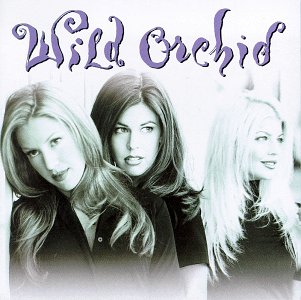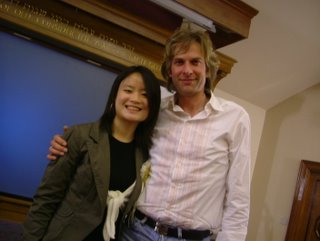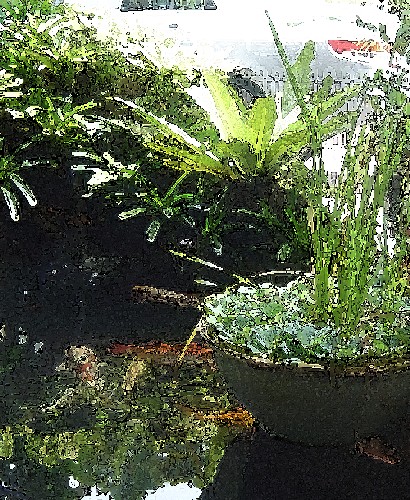Friday, December 30, 2005
I've been trying to read this book by Thomas Friedman titled, "The Lexus and The Olive Tree", which I got from the LSE library. Wanted to get "The World Is Flat" but someone had already taken it. Anyway.
Friedman essentially talks about globalisation in his book and what we need to do in response to this phenomenon. Here's an excerpt from Chapter 7 which I found particularly interesting.
In 1997, Dr Mahathir blasted “morons” who traded in currencies and accused “Great Powers” such as Soros of forcing Asians to open their domestic markets to global speculators and manipulating their currencies to destroy them.
Friedman speculates that this is what US Treasury Secretary Robert Rubin should have said in response:
"..don't you play dumb with me. We both know that your Central Bank lost 3 billion dollars speculating on the British pound in the early 1990s-so don't give me that innocence crap...Did you really need to build the two tallest office buildings in the world? Have you rented even half their office space? I hear not. So the KLCI Index fell 48% in 1997, and your currency hit a twenty-six year low..you don't ask the herd for mercy, you don't denounce the herd as a 'Jewish conspiracy', you just get up, dust yourself off...and get back with the flow of the herd."
The "herd" refers to faceless stock, bond and currency traders as well as big multinational companies who spread their investments across the world. The book was originally published in 1999 so I don't really know if the said under-utilised office space has been fully rented out at the moment.
Friedman also mentions a meeting with Anwar Ibrahim and a rough account of what the latter said to the the former PM at the height of the 1997 Asian economic crisis.
“Look, you said this about Soros on Monday, and the Malaysian ringgit fell to here. You said this about the Jews on Tuesday and the ringgit fell to here. You said this about global investors on Wednesday, and the ringgit fell to here. SHUT UP!”
It's cool to note what other people think about us.
Monday, December 26, 2005

Saturday, December 24, 2005



Nicole, Yanti, Tao and I went to watch the Black Eyed Peas in concert and I have to say that they are excellent performers. Found out that Fergie (Her real name's Stacey Ferguson) was originally from the girl pop trio, Wild Orchid (they sang "Talk to Me", if that rings any bells). I Wiki-ed it so you can check out the link here.

She's the one on the right in case you don't know.
Thursday, December 15, 2005
Sunday, December 11, 2005
Negara Malaysia mempunyai rakyat berbilang bangsa dan agama tetapi hidup dalam keadaan yang aman dan harmoni. (Malaysia consists of people of different creeds and religions and yet we live together peacefully.)That's standard SPM (the Malaysian GCSE equivalent) essay material for you. Thankfully, racial or religious tensions have not escalated to the extent of the Sunni-Shiite problem in Iraq nor the Islamophobia in the West.
However, contrary to the impression I got when I was still in school, we are certainly not the only multi-cultural hub in the world. Sure, we're a melting pot of cultures but so is France, the UK, Sri Lanka, Kenya -the statement above applies to Malaysia as equally as it would to many countries across the globe.
Salman Rushdie writes in reference to the multi-faceted society within the UK but I think that what he says can be applied to Malaysia as well.
When we, as individuals, pick and mix cultural elements for ourselves, we do not do so indiscriminately, but according to our natures. Societies, too, must retain the ability to discriminate, to reject as well as to accept, to value some things above others, and to insist on the acceptance of those values by all their members. This is the question of our time: how does a fractured community of multiple cultures decide what values it must share in order to cohere, and how can it insist on those values even when they clash with some citizens’ traditions and beliefs?
The beginnings of an answer may be found by asking the question the other way around: what does a society owe to its citizens? The French riots demonstrate a stark truth. If people do not feel included in the national idea, their alienation will turn to rage. Chouhan and others are right to insist that issues of social justice, racism and deprivation need urgently to be addressed. If we are to build a plural society on the foundation of what unites us, we must face up to what divides. But the questions of core freedoms and primary loyalties can’t be ducked. No society, no matter how tolerant, can expect to thrive if its citizens don’t prize what their citizenship means — if, when asked what they stand for as Frenchmen, as Indians, as Britons, they cannot give clear replies.
Undeniably, as a Malaysian Chinese, I identify myself more with Malaysian culture than with Chinese culture. By this I mean that when I compare myself with my friends from China or Hong Kong, I can draw stark differences between us and in relation to my Malaysian friends (again, regardless or race or religion) there is a sense of familiarity and common ground. However, if you were to ask me what my Malaysian citizenship means, I honestly can't give you a straight answer. Surely being Malaysian goes beyond our mamak culture, our obsession with multiple As in national exams and the priviledge of cheap DVDs?
Friday, December 09, 2005
When you press 'sell' instead of 'buy' or vice versa.
Yesterday, an unnamed trader at Japanese investment house Mizuho Securities, mistakenly placed an order to sell 610,000 J-Com shares at 1 yen each. Read more here.
The financial services watchdog in Tokyo is investigating the damage caused by a typing error that led Mizuho Securities - one of Japan's biggest brokerage firms - to lose at least 27bn yen (£128m). And here.
Over the summer I read in Malaysian news that some CIMB trader made the same mistake and I was like "D'oh, how can anyone be so blur?" I didn't know that accidentally doing something stupid like this would be a worldwide syndrome. Think about the silliest and most mindless thing that someone could ever do and at the expense of belittling my fellow mamak-loving friends, you have to admit that there's something inside you which will scream Malaysia Boleh!
I did a secret mental somersault and two handstands when I read this bit of news today. I guess we're not as stupid as we think we are.
Thursday, December 08, 2005
It's pretty unorthodox to put up an entire article on your blog, but oh well, here goes. I was lucky enough to be able to meet Adam Curry, pioneer of podcasting. If you haven't downloaded Pete Tong's Tongcast yet, do so now! You can find it on iTunes, his latest (No. 3) is really good. Also, this is one of the funnier podcasts I've heard recommended by none other than Mr Curry himself: It's Madge Weinstein's Yeast Radio; yeah really long name. Anyway, here's the article:

At the age of 14, Adam Curry built his first transistor radio and made his mom drive him around the block to see how far it would reach. Soon he was putting together home-made mixers and turntables, adding a mike to those later on to begin broadcasting to the kids around his neighbourhood.
Not many people I’ve heard of can boast of a CV like Curry’s. Starting off as the host of a weekly pop-music television program based in the Netherlands, where he grew up, he moved to New York in 1987 when MTV offered him a job as one of their VJs. He may have had plenty of pre-adolescent teeny-boppers swooning at his feet thanks to the shaggy blond mane he sported back then. But now, at 41, he’s creating waves of a different kind.
When we meet, I notice that Curry’s still got the same hairstyle albeit there’s much less of the volume which pretty much characterised the 80s. He’s dressed in a pair of light blue jeans coupled with a simple buttoned-down white shirt. Sounds like your average tech-geek to me. But a second glance allows me to notice a pierced right ear, rimless glasses, a silver bracelet on his right hand, a gold Rolex on his left and get this, a pair of black Ugg boots.
After being with MTV for 7 years, Curry quit one day to “check this Internet thing out”. He invested $500,000 in OnRamp Inc, a Web design and hosting company which he co-founded. Right before the Internet bubble burst in 1999, he sold it for $350 million, moved his family back to the Netherlands, bought a castle, bought a helicopter, learnt to fly one and all that other crazy dotcom stuff.
Curry has been shaking up the broadcasting industry of late with a brand new concept he helped pioneer called ‘podcasting’. In August this year, Curry’s new San Francisco-based company, snagged a sum of $8.9 million in venture capital from Kleiner Perkins Caufield & Byers and Sequioa Capital, the same bunch of people who backed Yahoo! and Google back in the 90s.
“There’s really a lot of interesting stuff on the Internet like talk shows and interviews. I found it really tiresome to go look for it, find it, see if there was anything new, download it, wait, wait, wait…. and then put it into iTunes and wait some more for iTunes to put it into your iPod,” says Curry.
So he talked to some software developers and asked if there was something that could be done to make all this automatic. Eveyone said that it was really easy but the problem was that none of them actually bothered to do it. So Curry decided to do it himself, put it out on open source upon completion one day and four hours later there were 20 developers who were hooked on to it. Not stopping there, he decided to put up The Daily Source Code, a daily geek-speak update for those working on the program, quite similar to a radio show which would pop up on your iPod everyday.
“A week later, I received emails from people saying that they loved my show….and they’d started making their own as well. After some time of listening to other people’s shows, I realised that I’d created magic.” And magic it is. Curry has created a new hybrid for conventional radio programmes. Not only can you download your favourite show and listen to it as and when and where you want to, you can also create your own –all you’ll need is a mike and some basic audio programming software which you’ll be able to download for free of the Internet.
So in a nutshell, podcasting is a sort of audioblog. Curry is subscribed to almost 300 different podcasts citing a mix of political and comedic podcasts, one of them being Yeast Radio (a podcast fronted by an angry Jewish lesbian with a yeast infection). He favours non-mainstream podcasts as opposed to those produced by the Wall Street Journal and MSN’s Slate.com because “I like stuff that’s breaking and burping -normal stuff that human beings do.”
I ask Curry why he’s so convinced that a future in podcasting is so financially viable when its predecessor, the weblog, hardly boasted any capital gains. “Weblogging stemmed from the inherent desire for people to publish. It’s not like all of a sudden, print sucks,” he replies. On the other hand, Curry says that radio, specifically radio in America, sucks big time. So there’s an actual demand for quality radio broadcasts. That’s the primary reason why podcasting has taken off in America. For avid Brit-radio fans and Pulse.com evangelists, the trend hasn’t taken off completely in the UK because according to him, “Radio doesn’t suck as bad here.”
So how exactly does Curry plan to turn PodShow Inc into the next Google? The answer lies in advertising. $30 billion is spent annually on radio ads and its been estimated that internet audio advertising will capture 3% to 4% of all radio advertising over the next 5 to 10 years. The ‘Podfather’, a name bestowed unto Curry by a fellow software developer, predicts a future reversal of roles. Instead of radio show managers running around for advertising revenue to fund their stations, big firms will soon have to audition for advertising opportunities on podcast shows – an elevation of sorts for podcasters to rockstar status.
Speaking of rockstars, Curry boldly predicts that “…within 18 months, the music business will crumble.” With illegal downloads escalating exponentially these days, that’s not too far-fetched an idea. He talks about another brainchild of his, the Podsafe Music Network, through which bands authorise podcasters to use their music for free on their shows. “I have150,000 people listening to my podcast. If I play a song 3 times a month, that song will sell at least a thousand copies –it’s been proven. If a song is played on a thousand podcasts with each having a thousand listeners, you’ve effectively got a million spins. That’s unheard of in radio land and there’s undoubtedly going to be that 1% at least who’s going to go out and buy the actual record.”
Let’s do some more simple arithmetic: Judging from current market conditions, PodShow Inc has few competitors. If podcasting takes off successfully, Curry and his team are bound to be eating a very large portion of the $1.2 billion advertising cake. So here we’ve got a guy sitting in front of a PC, talking to himself into a mike, sounds pretty sad if you ask me. But contrary to that, Curry has evidently added a cool-factor and a spunky, avante garde dimension to an otherwise mundane technological innovation. So if the venture capitalists got it right, Curry could be flying over England in the near future with another new helicopter and perhaps making an aerial search for an English castle.

291206












 Tock and Farah
Tock and Farah



